Strategic Management Report: Oil and Gas Industry in Nigeria
VerifiedAdded on 2021/11/15
|12
|3154
|31
Report
AI Summary
This report provides a comprehensive strategic analysis of the oil and gas industry in Nigeria. It begins with an executive summary outlining the report's structure, which includes an examination of the external environment using PESTEL analysis, and an industry analysis employing Porter's Five Forces framework. The report also assesses the internal environment of oil and gas businesses through a SWOT analysis and explores marketing strategies and business models. Key performance indicators (KPIs) are discussed, and the report concludes by emphasizing the potential for revenue growth through effective natural resource management in the Nigerian oil and gas sector. References are included for further study. The report highlights the impact of political, economic, social, technological, legal, and environmental factors on the industry's operations.
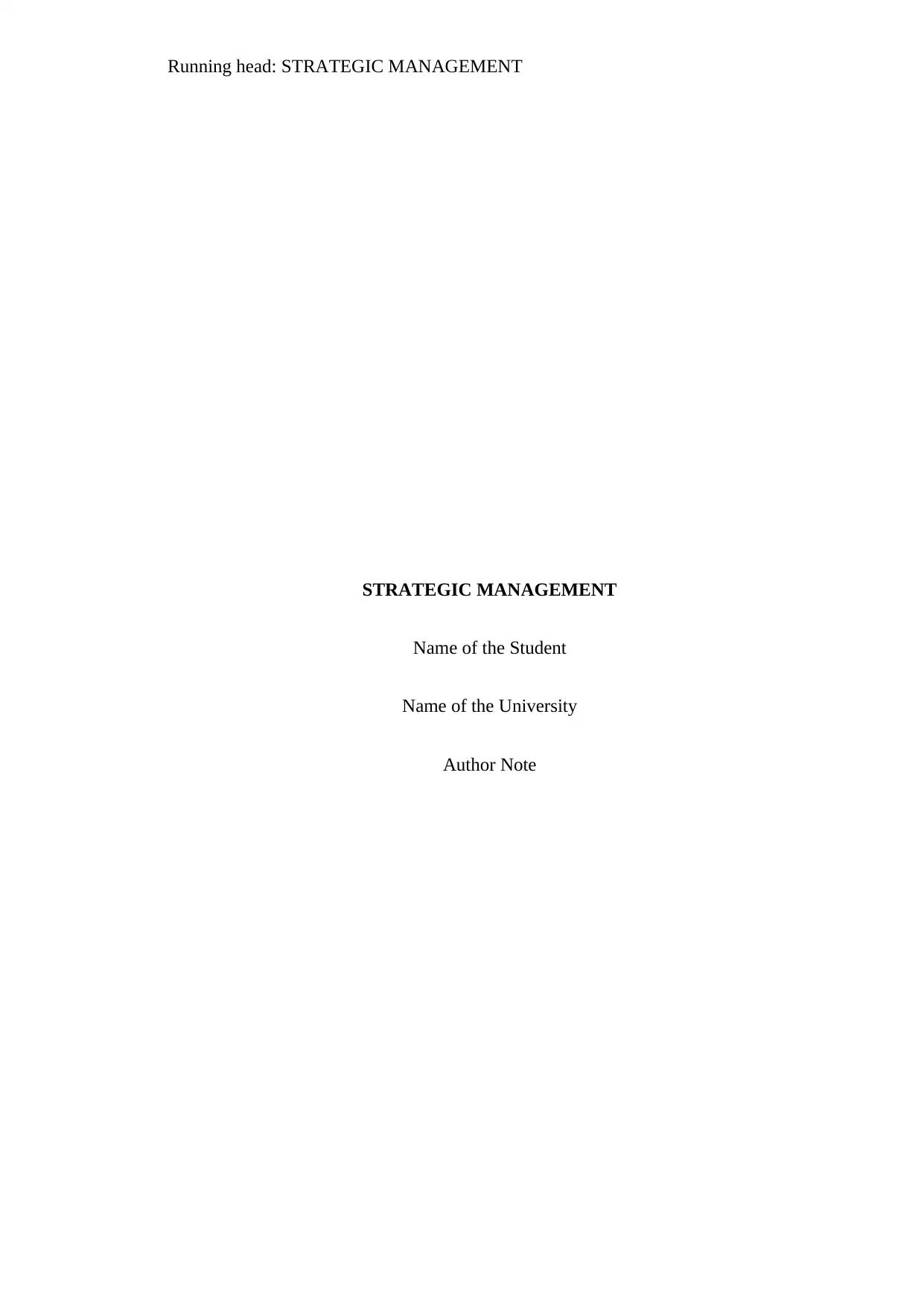
Running head: STRATEGIC MANAGEMENT
STRATEGIC MANAGEMENT
Name of the Student
Name of the University
Author Note
STRATEGIC MANAGEMENT
Name of the Student
Name of the University
Author Note
Paraphrase This Document
Need a fresh take? Get an instant paraphrase of this document with our AI Paraphraser
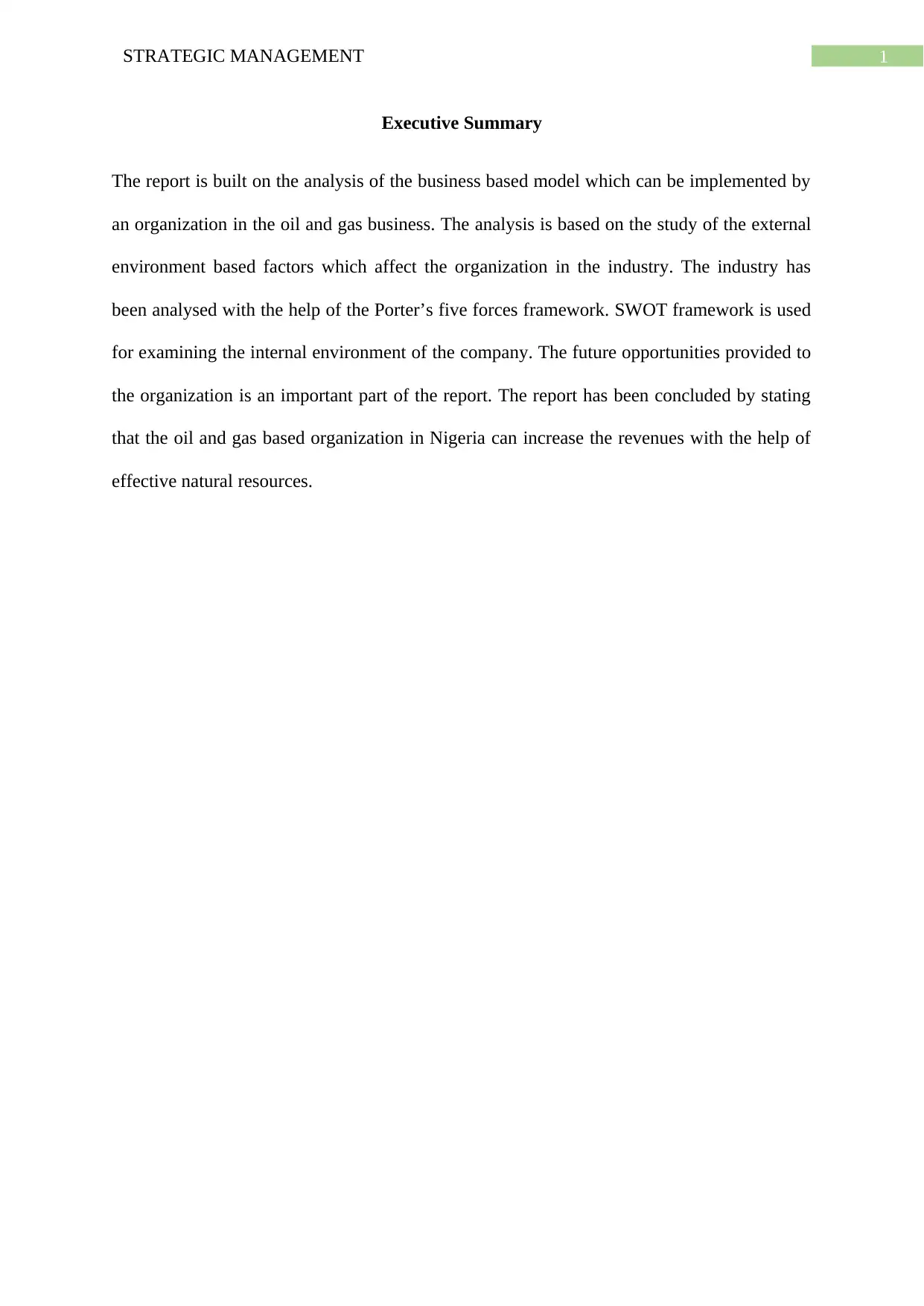
1STRATEGIC MANAGEMENT
Executive Summary
The report is built on the analysis of the business based model which can be implemented by
an organization in the oil and gas business. The analysis is based on the study of the external
environment based factors which affect the organization in the industry. The industry has
been analysed with the help of the Porter’s five forces framework. SWOT framework is used
for examining the internal environment of the company. The future opportunities provided to
the organization is an important part of the report. The report has been concluded by stating
that the oil and gas based organization in Nigeria can increase the revenues with the help of
effective natural resources.
Executive Summary
The report is built on the analysis of the business based model which can be implemented by
an organization in the oil and gas business. The analysis is based on the study of the external
environment based factors which affect the organization in the industry. The industry has
been analysed with the help of the Porter’s five forces framework. SWOT framework is used
for examining the internal environment of the company. The future opportunities provided to
the organization is an important part of the report. The report has been concluded by stating
that the oil and gas based organization in Nigeria can increase the revenues with the help of
effective natural resources.
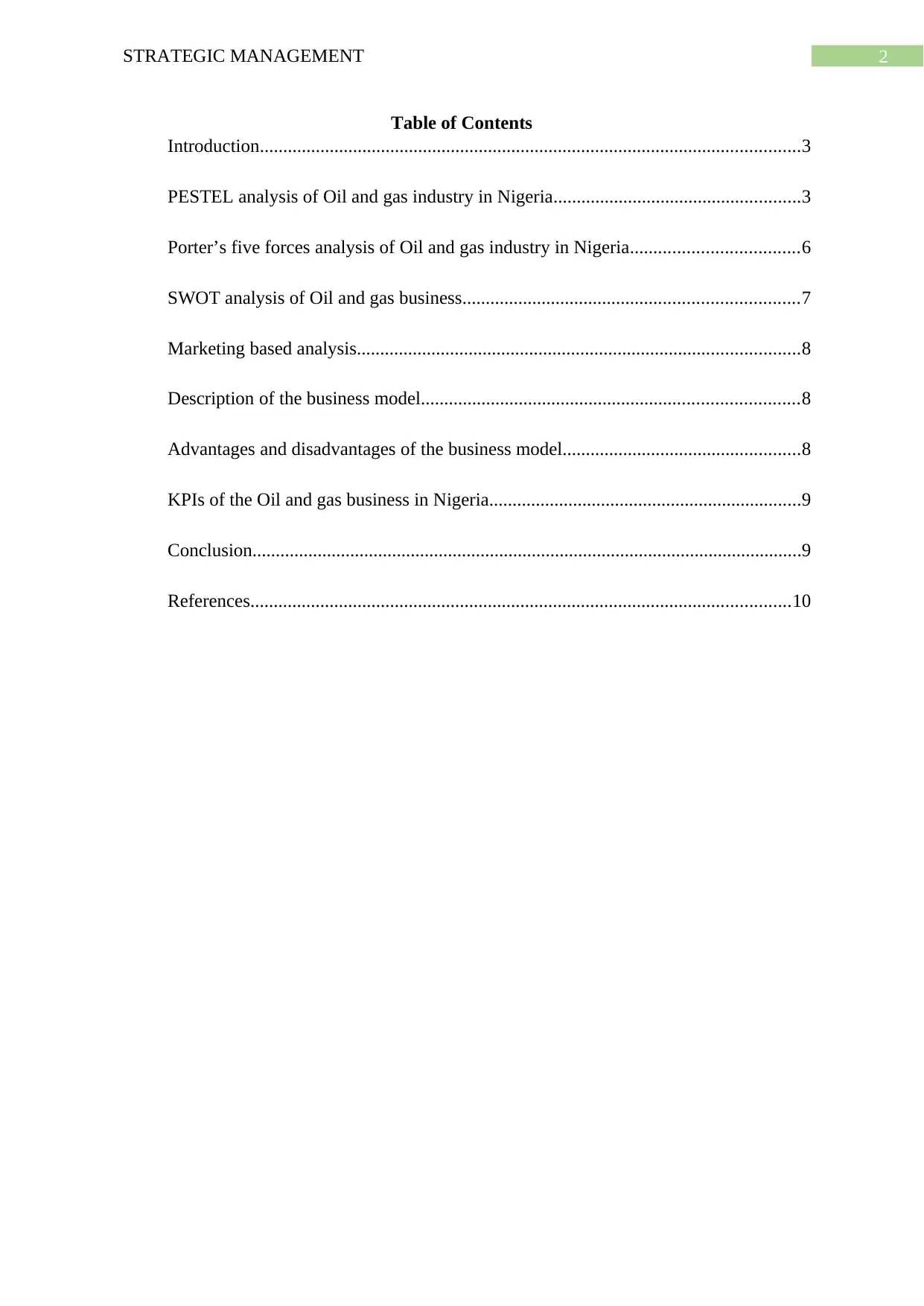
2STRATEGIC MANAGEMENT
Table of Contents
Introduction....................................................................................................................3
PESTEL analysis of Oil and gas industry in Nigeria.....................................................3
Porter’s five forces analysis of Oil and gas industry in Nigeria....................................6
SWOT analysis of Oil and gas business........................................................................7
Marketing based analysis...............................................................................................8
Description of the business model.................................................................................8
Advantages and disadvantages of the business model...................................................8
KPIs of the Oil and gas business in Nigeria...................................................................9
Conclusion......................................................................................................................9
References....................................................................................................................10
Table of Contents
Introduction....................................................................................................................3
PESTEL analysis of Oil and gas industry in Nigeria.....................................................3
Porter’s five forces analysis of Oil and gas industry in Nigeria....................................6
SWOT analysis of Oil and gas business........................................................................7
Marketing based analysis...............................................................................................8
Description of the business model.................................................................................8
Advantages and disadvantages of the business model...................................................8
KPIs of the Oil and gas business in Nigeria...................................................................9
Conclusion......................................................................................................................9
References....................................................................................................................10
⊘ This is a preview!⊘
Do you want full access?
Subscribe today to unlock all pages.

Trusted by 1+ million students worldwide
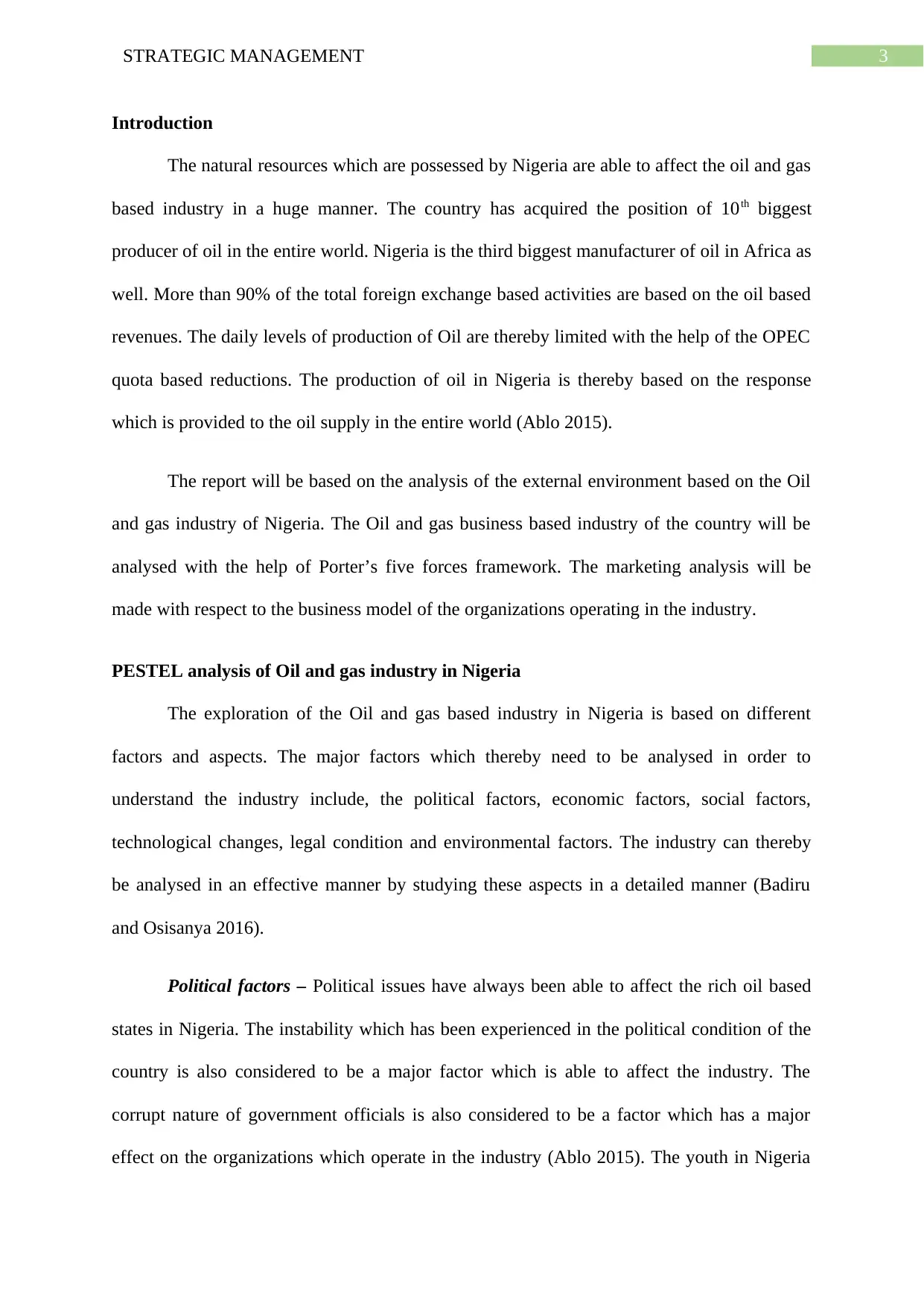
3STRATEGIC MANAGEMENT
Introduction
The natural resources which are possessed by Nigeria are able to affect the oil and gas
based industry in a huge manner. The country has acquired the position of 10th biggest
producer of oil in the entire world. Nigeria is the third biggest manufacturer of oil in Africa as
well. More than 90% of the total foreign exchange based activities are based on the oil based
revenues. The daily levels of production of Oil are thereby limited with the help of the OPEC
quota based reductions. The production of oil in Nigeria is thereby based on the response
which is provided to the oil supply in the entire world (Ablo 2015).
The report will be based on the analysis of the external environment based on the Oil
and gas industry of Nigeria. The Oil and gas business based industry of the country will be
analysed with the help of Porter’s five forces framework. The marketing analysis will be
made with respect to the business model of the organizations operating in the industry.
PESTEL analysis of Oil and gas industry in Nigeria
The exploration of the Oil and gas based industry in Nigeria is based on different
factors and aspects. The major factors which thereby need to be analysed in order to
understand the industry include, the political factors, economic factors, social factors,
technological changes, legal condition and environmental factors. The industry can thereby
be analysed in an effective manner by studying these aspects in a detailed manner (Badiru
and Osisanya 2016).
Political factors – Political issues have always been able to affect the rich oil based
states in Nigeria. The instability which has been experienced in the political condition of the
country is also considered to be a major factor which is able to affect the industry. The
corrupt nature of government officials is also considered to be a factor which has a major
effect on the organizations which operate in the industry (Ablo 2015). The youth in Nigeria
Introduction
The natural resources which are possessed by Nigeria are able to affect the oil and gas
based industry in a huge manner. The country has acquired the position of 10th biggest
producer of oil in the entire world. Nigeria is the third biggest manufacturer of oil in Africa as
well. More than 90% of the total foreign exchange based activities are based on the oil based
revenues. The daily levels of production of Oil are thereby limited with the help of the OPEC
quota based reductions. The production of oil in Nigeria is thereby based on the response
which is provided to the oil supply in the entire world (Ablo 2015).
The report will be based on the analysis of the external environment based on the Oil
and gas industry of Nigeria. The Oil and gas business based industry of the country will be
analysed with the help of Porter’s five forces framework. The marketing analysis will be
made with respect to the business model of the organizations operating in the industry.
PESTEL analysis of Oil and gas industry in Nigeria
The exploration of the Oil and gas based industry in Nigeria is based on different
factors and aspects. The major factors which thereby need to be analysed in order to
understand the industry include, the political factors, economic factors, social factors,
technological changes, legal condition and environmental factors. The industry can thereby
be analysed in an effective manner by studying these aspects in a detailed manner (Badiru
and Osisanya 2016).
Political factors – Political issues have always been able to affect the rich oil based
states in Nigeria. The instability which has been experienced in the political condition of the
country is also considered to be a major factor which is able to affect the industry. The
corrupt nature of government officials is also considered to be a factor which has a major
effect on the organizations which operate in the industry (Ablo 2015). The youth in Nigeria
Paraphrase This Document
Need a fresh take? Get an instant paraphrase of this document with our AI Paraphraser
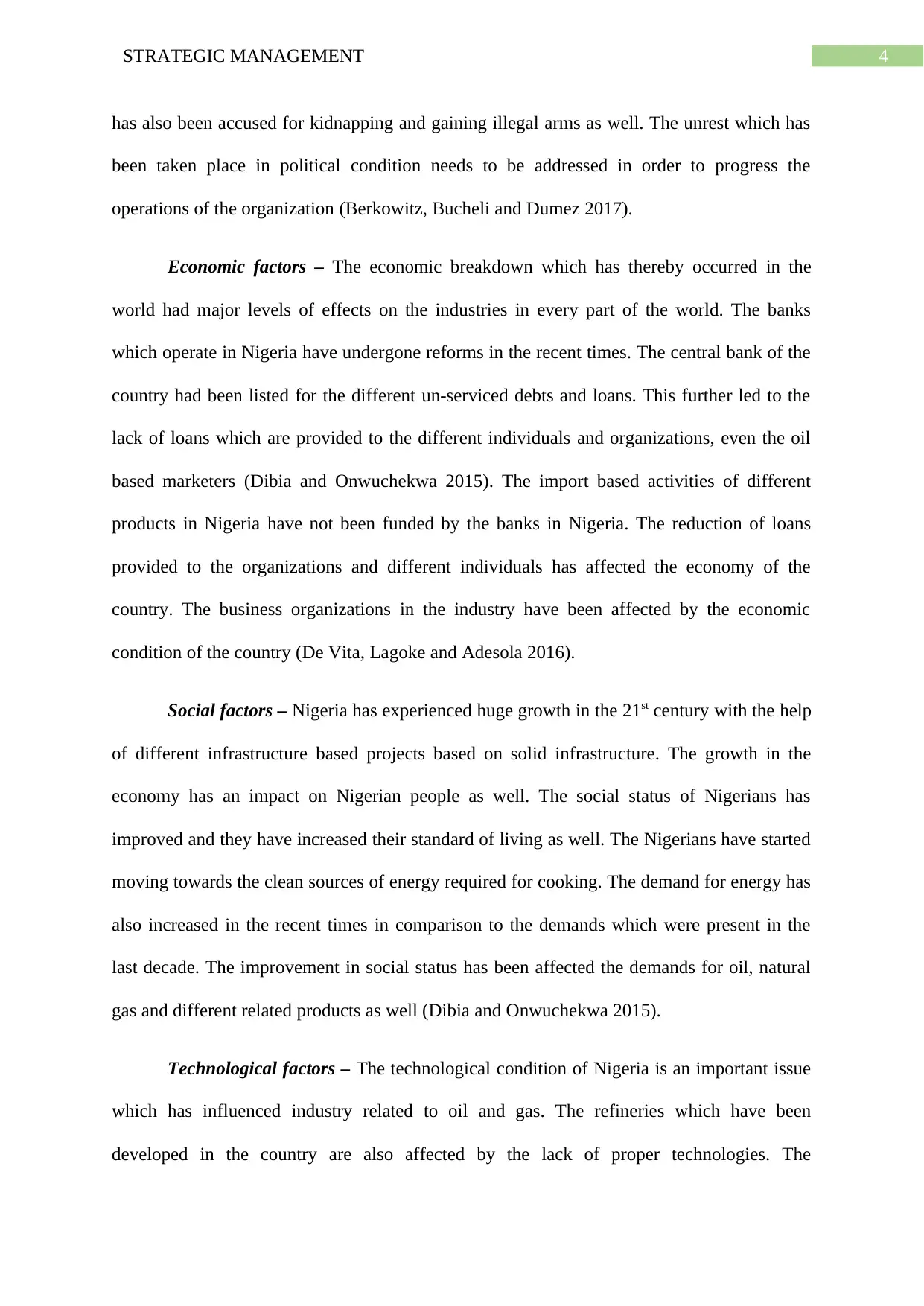
4STRATEGIC MANAGEMENT
has also been accused for kidnapping and gaining illegal arms as well. The unrest which has
been taken place in political condition needs to be addressed in order to progress the
operations of the organization (Berkowitz, Bucheli and Dumez 2017).
Economic factors – The economic breakdown which has thereby occurred in the
world had major levels of effects on the industries in every part of the world. The banks
which operate in Nigeria have undergone reforms in the recent times. The central bank of the
country had been listed for the different un-serviced debts and loans. This further led to the
lack of loans which are provided to the different individuals and organizations, even the oil
based marketers (Dibia and Onwuchekwa 2015). The import based activities of different
products in Nigeria have not been funded by the banks in Nigeria. The reduction of loans
provided to the organizations and different individuals has affected the economy of the
country. The business organizations in the industry have been affected by the economic
condition of the country (De Vita, Lagoke and Adesola 2016).
Social factors – Nigeria has experienced huge growth in the 21st century with the help
of different infrastructure based projects based on solid infrastructure. The growth in the
economy has an impact on Nigerian people as well. The social status of Nigerians has
improved and they have increased their standard of living as well. The Nigerians have started
moving towards the clean sources of energy required for cooking. The demand for energy has
also increased in the recent times in comparison to the demands which were present in the
last decade. The improvement in social status has been affected the demands for oil, natural
gas and different related products as well (Dibia and Onwuchekwa 2015).
Technological factors – The technological condition of Nigeria is an important issue
which has influenced industry related to oil and gas. The refineries which have been
developed in the country are also affected by the lack of proper technologies. The
has also been accused for kidnapping and gaining illegal arms as well. The unrest which has
been taken place in political condition needs to be addressed in order to progress the
operations of the organization (Berkowitz, Bucheli and Dumez 2017).
Economic factors – The economic breakdown which has thereby occurred in the
world had major levels of effects on the industries in every part of the world. The banks
which operate in Nigeria have undergone reforms in the recent times. The central bank of the
country had been listed for the different un-serviced debts and loans. This further led to the
lack of loans which are provided to the different individuals and organizations, even the oil
based marketers (Dibia and Onwuchekwa 2015). The import based activities of different
products in Nigeria have not been funded by the banks in Nigeria. The reduction of loans
provided to the organizations and different individuals has affected the economy of the
country. The business organizations in the industry have been affected by the economic
condition of the country (De Vita, Lagoke and Adesola 2016).
Social factors – Nigeria has experienced huge growth in the 21st century with the help
of different infrastructure based projects based on solid infrastructure. The growth in the
economy has an impact on Nigerian people as well. The social status of Nigerians has
improved and they have increased their standard of living as well. The Nigerians have started
moving towards the clean sources of energy required for cooking. The demand for energy has
also increased in the recent times in comparison to the demands which were present in the
last decade. The improvement in social status has been affected the demands for oil, natural
gas and different related products as well (Dibia and Onwuchekwa 2015).
Technological factors – The technological condition of Nigeria is an important issue
which has influenced industry related to oil and gas. The refineries which have been
developed in the country are also affected by the lack of proper technologies. The
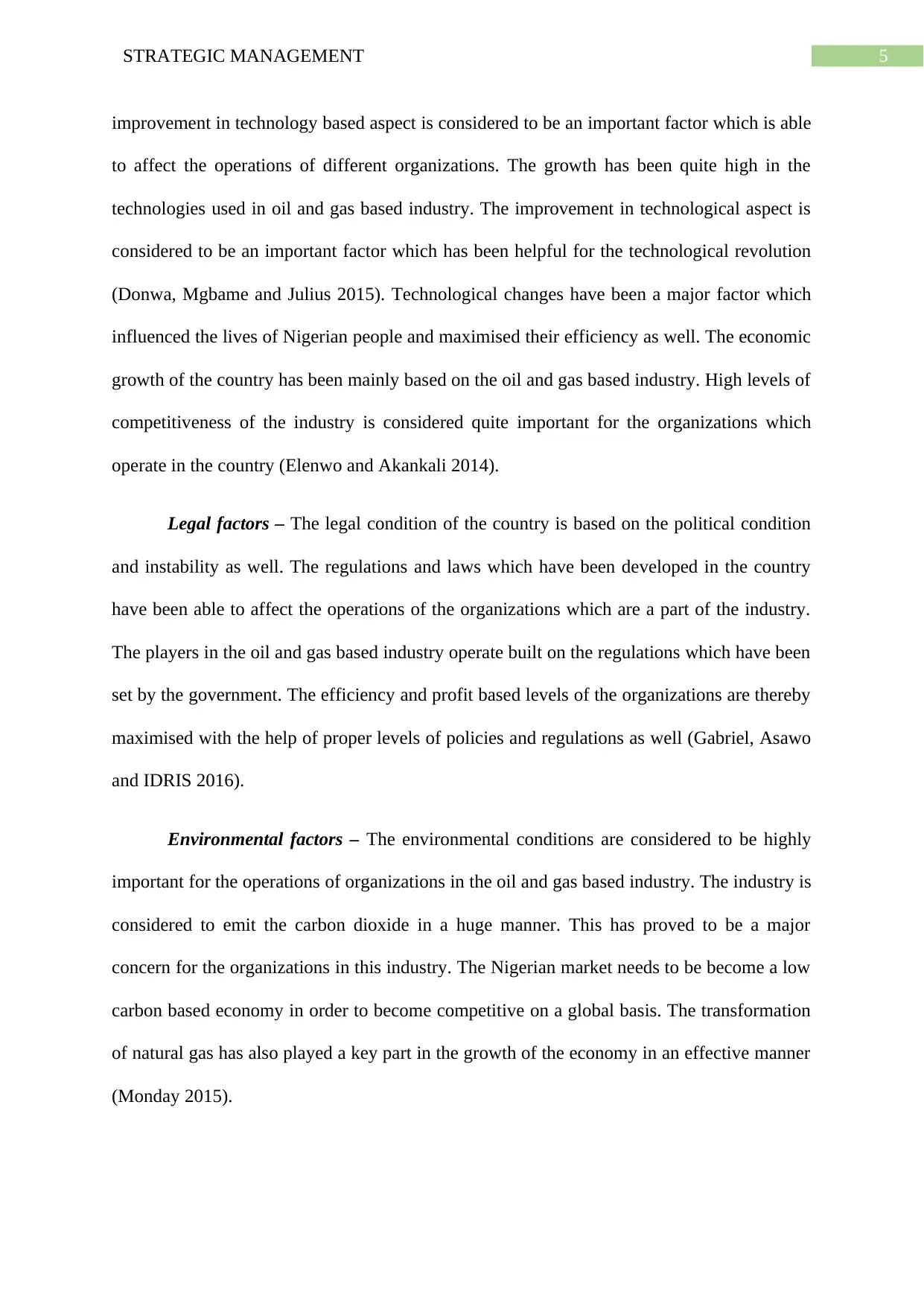
5STRATEGIC MANAGEMENT
improvement in technology based aspect is considered to be an important factor which is able
to affect the operations of different organizations. The growth has been quite high in the
technologies used in oil and gas based industry. The improvement in technological aspect is
considered to be an important factor which has been helpful for the technological revolution
(Donwa, Mgbame and Julius 2015). Technological changes have been a major factor which
influenced the lives of Nigerian people and maximised their efficiency as well. The economic
growth of the country has been mainly based on the oil and gas based industry. High levels of
competitiveness of the industry is considered quite important for the organizations which
operate in the country (Elenwo and Akankali 2014).
Legal factors – The legal condition of the country is based on the political condition
and instability as well. The regulations and laws which have been developed in the country
have been able to affect the operations of the organizations which are a part of the industry.
The players in the oil and gas based industry operate built on the regulations which have been
set by the government. The efficiency and profit based levels of the organizations are thereby
maximised with the help of proper levels of policies and regulations as well (Gabriel, Asawo
and IDRIS 2016).
Environmental factors – The environmental conditions are considered to be highly
important for the operations of organizations in the oil and gas based industry. The industry is
considered to emit the carbon dioxide in a huge manner. This has proved to be a major
concern for the organizations in this industry. The Nigerian market needs to be become a low
carbon based economy in order to become competitive on a global basis. The transformation
of natural gas has also played a key part in the growth of the economy in an effective manner
(Monday 2015).
improvement in technology based aspect is considered to be an important factor which is able
to affect the operations of different organizations. The growth has been quite high in the
technologies used in oil and gas based industry. The improvement in technological aspect is
considered to be an important factor which has been helpful for the technological revolution
(Donwa, Mgbame and Julius 2015). Technological changes have been a major factor which
influenced the lives of Nigerian people and maximised their efficiency as well. The economic
growth of the country has been mainly based on the oil and gas based industry. High levels of
competitiveness of the industry is considered quite important for the organizations which
operate in the country (Elenwo and Akankali 2014).
Legal factors – The legal condition of the country is based on the political condition
and instability as well. The regulations and laws which have been developed in the country
have been able to affect the operations of the organizations which are a part of the industry.
The players in the oil and gas based industry operate built on the regulations which have been
set by the government. The efficiency and profit based levels of the organizations are thereby
maximised with the help of proper levels of policies and regulations as well (Gabriel, Asawo
and IDRIS 2016).
Environmental factors – The environmental conditions are considered to be highly
important for the operations of organizations in the oil and gas based industry. The industry is
considered to emit the carbon dioxide in a huge manner. This has proved to be a major
concern for the organizations in this industry. The Nigerian market needs to be become a low
carbon based economy in order to become competitive on a global basis. The transformation
of natural gas has also played a key part in the growth of the economy in an effective manner
(Monday 2015).
⊘ This is a preview!⊘
Do you want full access?
Subscribe today to unlock all pages.

Trusted by 1+ million students worldwide
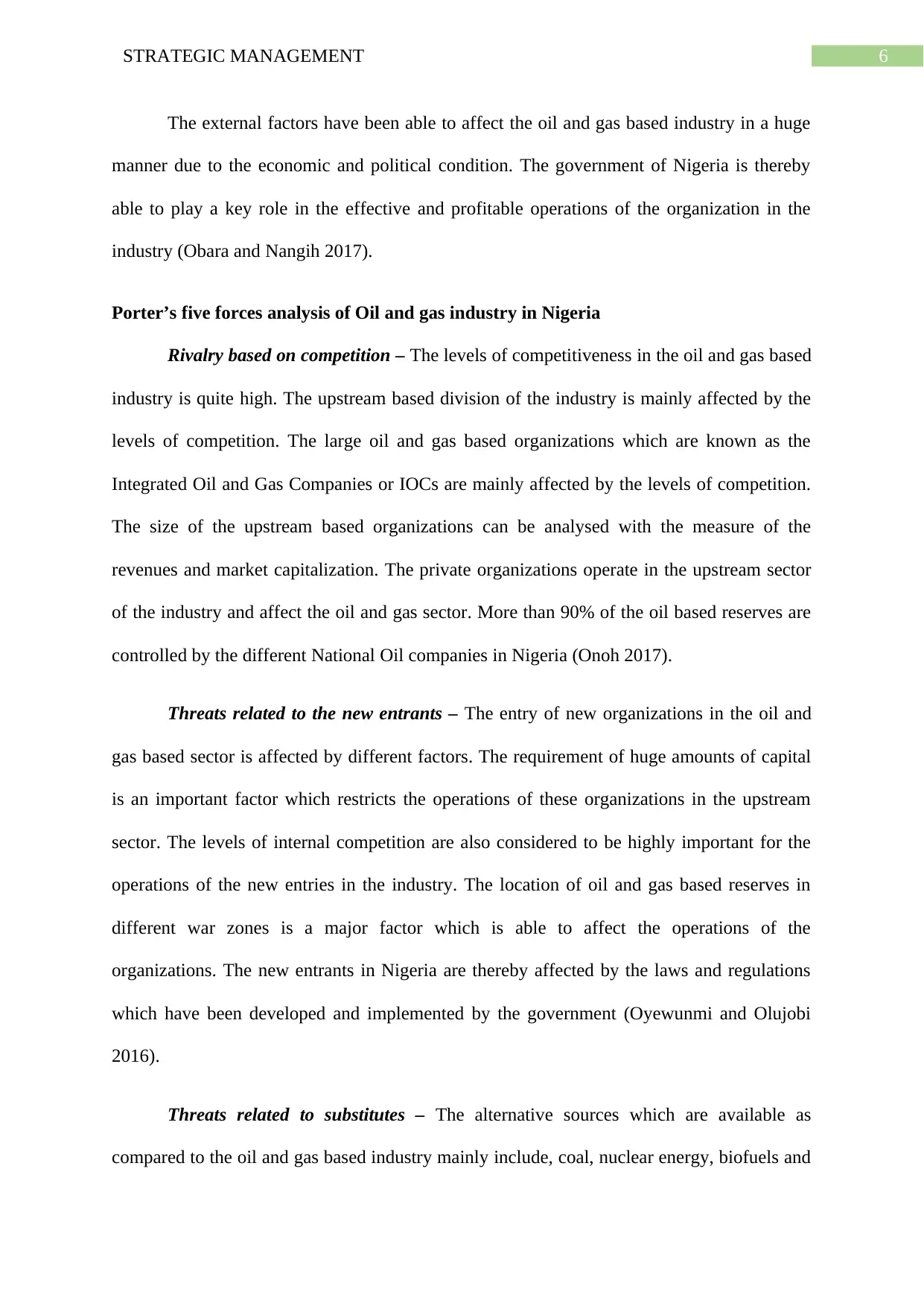
6STRATEGIC MANAGEMENT
The external factors have been able to affect the oil and gas based industry in a huge
manner due to the economic and political condition. The government of Nigeria is thereby
able to play a key role in the effective and profitable operations of the organization in the
industry (Obara and Nangih 2017).
Porter’s five forces analysis of Oil and gas industry in Nigeria
Rivalry based on competition – The levels of competitiveness in the oil and gas based
industry is quite high. The upstream based division of the industry is mainly affected by the
levels of competition. The large oil and gas based organizations which are known as the
Integrated Oil and Gas Companies or IOCs are mainly affected by the levels of competition.
The size of the upstream based organizations can be analysed with the measure of the
revenues and market capitalization. The private organizations operate in the upstream sector
of the industry and affect the oil and gas sector. More than 90% of the oil based reserves are
controlled by the different National Oil companies in Nigeria (Onoh 2017).
Threats related to the new entrants – The entry of new organizations in the oil and
gas based sector is affected by different factors. The requirement of huge amounts of capital
is an important factor which restricts the operations of these organizations in the upstream
sector. The levels of internal competition are also considered to be highly important for the
operations of the new entries in the industry. The location of oil and gas based reserves in
different war zones is a major factor which is able to affect the operations of the
organizations. The new entrants in Nigeria are thereby affected by the laws and regulations
which have been developed and implemented by the government (Oyewunmi and Olujobi
2016).
Threats related to substitutes – The alternative sources which are available as
compared to the oil and gas based industry mainly include, coal, nuclear energy, biofuels and
The external factors have been able to affect the oil and gas based industry in a huge
manner due to the economic and political condition. The government of Nigeria is thereby
able to play a key role in the effective and profitable operations of the organization in the
industry (Obara and Nangih 2017).
Porter’s five forces analysis of Oil and gas industry in Nigeria
Rivalry based on competition – The levels of competitiveness in the oil and gas based
industry is quite high. The upstream based division of the industry is mainly affected by the
levels of competition. The large oil and gas based organizations which are known as the
Integrated Oil and Gas Companies or IOCs are mainly affected by the levels of competition.
The size of the upstream based organizations can be analysed with the measure of the
revenues and market capitalization. The private organizations operate in the upstream sector
of the industry and affect the oil and gas sector. More than 90% of the oil based reserves are
controlled by the different National Oil companies in Nigeria (Onoh 2017).
Threats related to the new entrants – The entry of new organizations in the oil and
gas based sector is affected by different factors. The requirement of huge amounts of capital
is an important factor which restricts the operations of these organizations in the upstream
sector. The levels of internal competition are also considered to be highly important for the
operations of the new entries in the industry. The location of oil and gas based reserves in
different war zones is a major factor which is able to affect the operations of the
organizations. The new entrants in Nigeria are thereby affected by the laws and regulations
which have been developed and implemented by the government (Oyewunmi and Olujobi
2016).
Threats related to substitutes – The alternative sources which are available as
compared to the oil and gas based industry mainly include, coal, nuclear energy, biofuels and
Paraphrase This Document
Need a fresh take? Get an instant paraphrase of this document with our AI Paraphraser
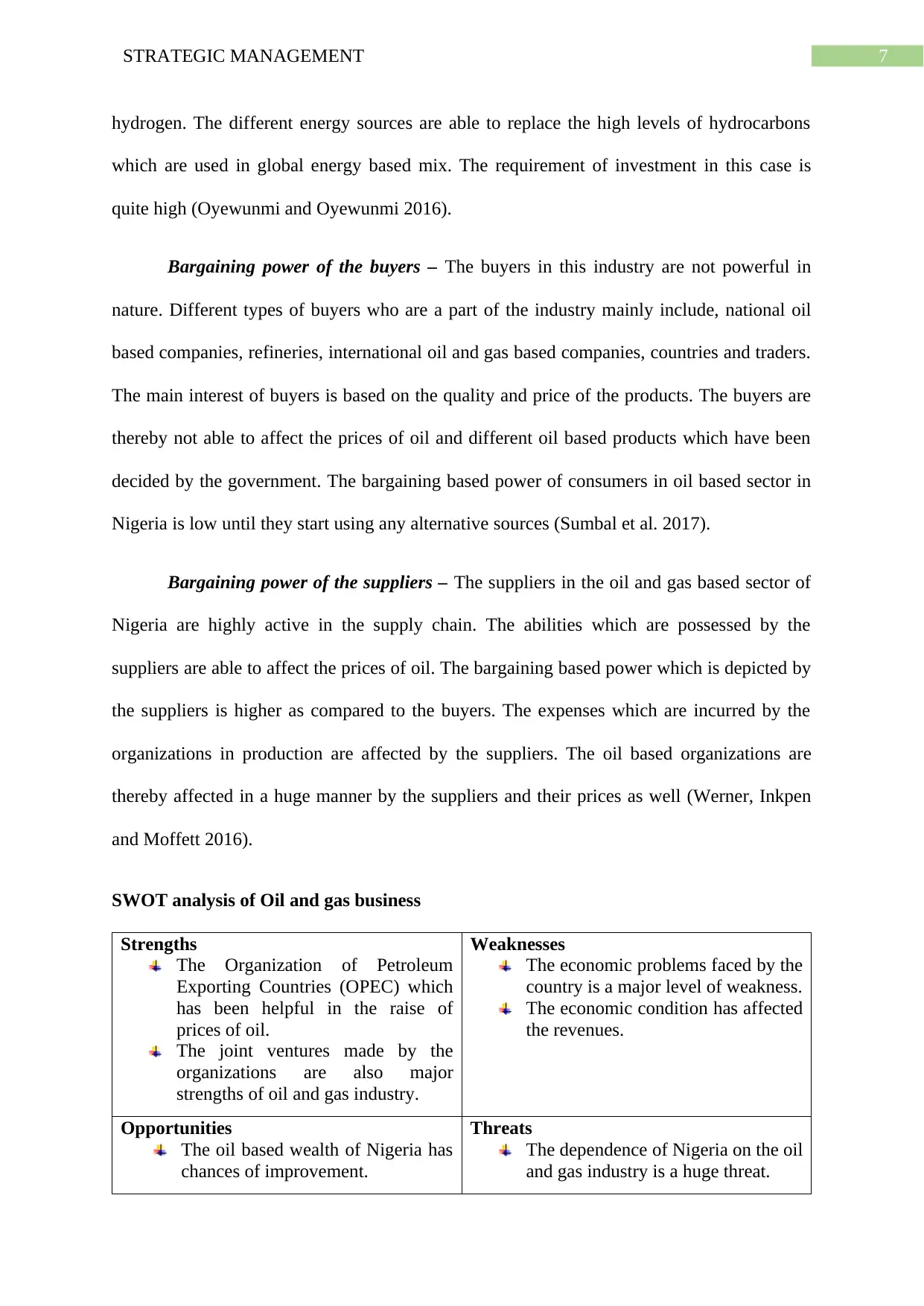
7STRATEGIC MANAGEMENT
hydrogen. The different energy sources are able to replace the high levels of hydrocarbons
which are used in global energy based mix. The requirement of investment in this case is
quite high (Oyewunmi and Oyewunmi 2016).
Bargaining power of the buyers – The buyers in this industry are not powerful in
nature. Different types of buyers who are a part of the industry mainly include, national oil
based companies, refineries, international oil and gas based companies, countries and traders.
The main interest of buyers is based on the quality and price of the products. The buyers are
thereby not able to affect the prices of oil and different oil based products which have been
decided by the government. The bargaining based power of consumers in oil based sector in
Nigeria is low until they start using any alternative sources (Sumbal et al. 2017).
Bargaining power of the suppliers – The suppliers in the oil and gas based sector of
Nigeria are highly active in the supply chain. The abilities which are possessed by the
suppliers are able to affect the prices of oil. The bargaining based power which is depicted by
the suppliers is higher as compared to the buyers. The expenses which are incurred by the
organizations in production are affected by the suppliers. The oil based organizations are
thereby affected in a huge manner by the suppliers and their prices as well (Werner, Inkpen
and Moffett 2016).
SWOT analysis of Oil and gas business
Strengths
The Organization of Petroleum
Exporting Countries (OPEC) which
has been helpful in the raise of
prices of oil.
The joint ventures made by the
organizations are also major
strengths of oil and gas industry.
Weaknesses
The economic problems faced by the
country is a major level of weakness.
The economic condition has affected
the revenues.
Opportunities
The oil based wealth of Nigeria has
chances of improvement.
Threats
The dependence of Nigeria on the oil
and gas industry is a huge threat.
hydrogen. The different energy sources are able to replace the high levels of hydrocarbons
which are used in global energy based mix. The requirement of investment in this case is
quite high (Oyewunmi and Oyewunmi 2016).
Bargaining power of the buyers – The buyers in this industry are not powerful in
nature. Different types of buyers who are a part of the industry mainly include, national oil
based companies, refineries, international oil and gas based companies, countries and traders.
The main interest of buyers is based on the quality and price of the products. The buyers are
thereby not able to affect the prices of oil and different oil based products which have been
decided by the government. The bargaining based power of consumers in oil based sector in
Nigeria is low until they start using any alternative sources (Sumbal et al. 2017).
Bargaining power of the suppliers – The suppliers in the oil and gas based sector of
Nigeria are highly active in the supply chain. The abilities which are possessed by the
suppliers are able to affect the prices of oil. The bargaining based power which is depicted by
the suppliers is higher as compared to the buyers. The expenses which are incurred by the
organizations in production are affected by the suppliers. The oil based organizations are
thereby affected in a huge manner by the suppliers and their prices as well (Werner, Inkpen
and Moffett 2016).
SWOT analysis of Oil and gas business
Strengths
The Organization of Petroleum
Exporting Countries (OPEC) which
has been helpful in the raise of
prices of oil.
The joint ventures made by the
organizations are also major
strengths of oil and gas industry.
Weaknesses
The economic problems faced by the
country is a major level of weakness.
The economic condition has affected
the revenues.
Opportunities
The oil based wealth of Nigeria has
chances of improvement.
Threats
The dependence of Nigeria on the oil
and gas industry is a huge threat.
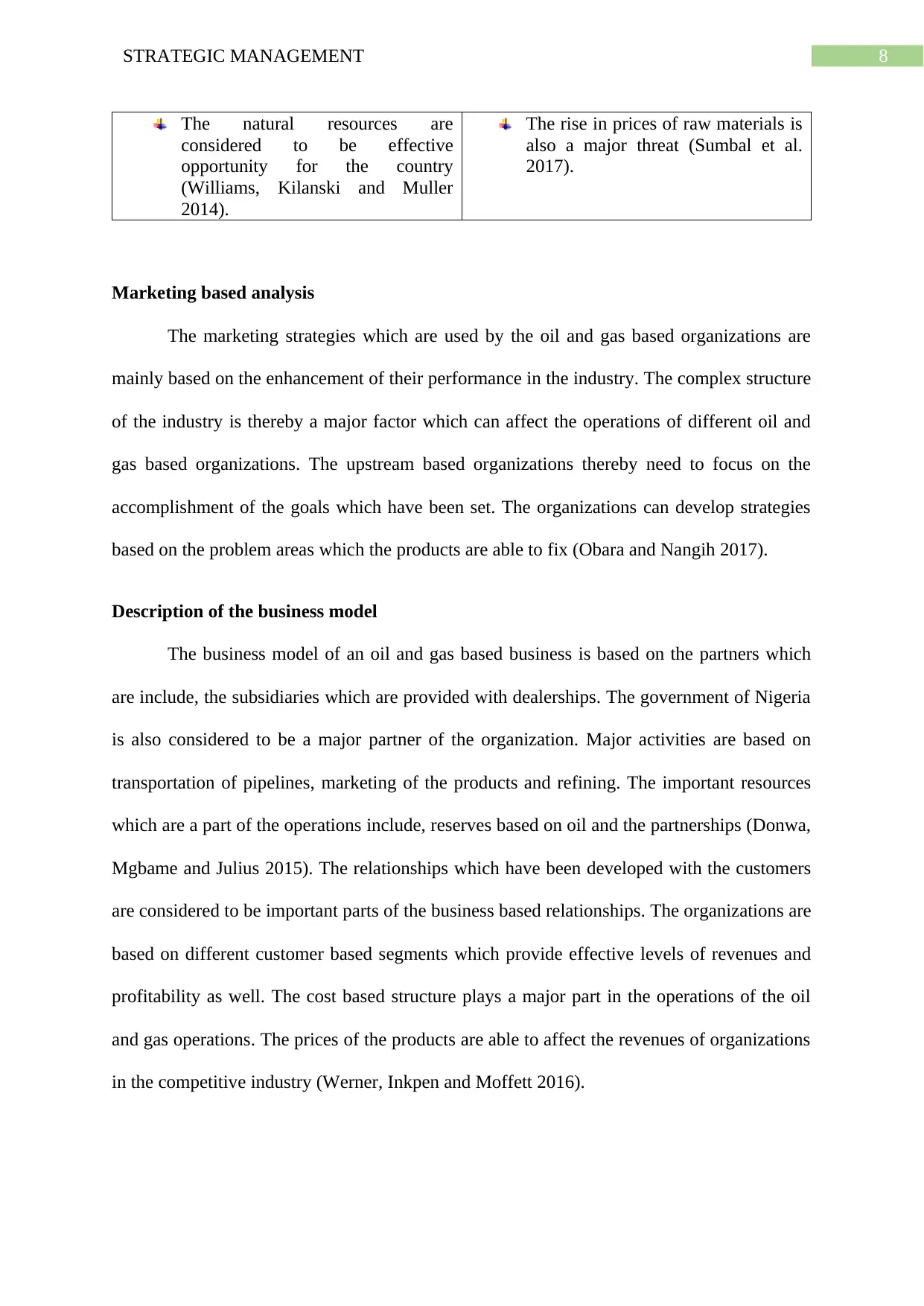
8STRATEGIC MANAGEMENT
The natural resources are
considered to be effective
opportunity for the country
(Williams, Kilanski and Muller
2014).
The rise in prices of raw materials is
also a major threat (Sumbal et al.
2017).
Marketing based analysis
The marketing strategies which are used by the oil and gas based organizations are
mainly based on the enhancement of their performance in the industry. The complex structure
of the industry is thereby a major factor which can affect the operations of different oil and
gas based organizations. The upstream based organizations thereby need to focus on the
accomplishment of the goals which have been set. The organizations can develop strategies
based on the problem areas which the products are able to fix (Obara and Nangih 2017).
Description of the business model
The business model of an oil and gas based business is based on the partners which
are include, the subsidiaries which are provided with dealerships. The government of Nigeria
is also considered to be a major partner of the organization. Major activities are based on
transportation of pipelines, marketing of the products and refining. The important resources
which are a part of the operations include, reserves based on oil and the partnerships (Donwa,
Mgbame and Julius 2015). The relationships which have been developed with the customers
are considered to be important parts of the business based relationships. The organizations are
based on different customer based segments which provide effective levels of revenues and
profitability as well. The cost based structure plays a major part in the operations of the oil
and gas operations. The prices of the products are able to affect the revenues of organizations
in the competitive industry (Werner, Inkpen and Moffett 2016).
The natural resources are
considered to be effective
opportunity for the country
(Williams, Kilanski and Muller
2014).
The rise in prices of raw materials is
also a major threat (Sumbal et al.
2017).
Marketing based analysis
The marketing strategies which are used by the oil and gas based organizations are
mainly based on the enhancement of their performance in the industry. The complex structure
of the industry is thereby a major factor which can affect the operations of different oil and
gas based organizations. The upstream based organizations thereby need to focus on the
accomplishment of the goals which have been set. The organizations can develop strategies
based on the problem areas which the products are able to fix (Obara and Nangih 2017).
Description of the business model
The business model of an oil and gas based business is based on the partners which
are include, the subsidiaries which are provided with dealerships. The government of Nigeria
is also considered to be a major partner of the organization. Major activities are based on
transportation of pipelines, marketing of the products and refining. The important resources
which are a part of the operations include, reserves based on oil and the partnerships (Donwa,
Mgbame and Julius 2015). The relationships which have been developed with the customers
are considered to be important parts of the business based relationships. The organizations are
based on different customer based segments which provide effective levels of revenues and
profitability as well. The cost based structure plays a major part in the operations of the oil
and gas operations. The prices of the products are able to affect the revenues of organizations
in the competitive industry (Werner, Inkpen and Moffett 2016).
⊘ This is a preview!⊘
Do you want full access?
Subscribe today to unlock all pages.

Trusted by 1+ million students worldwide
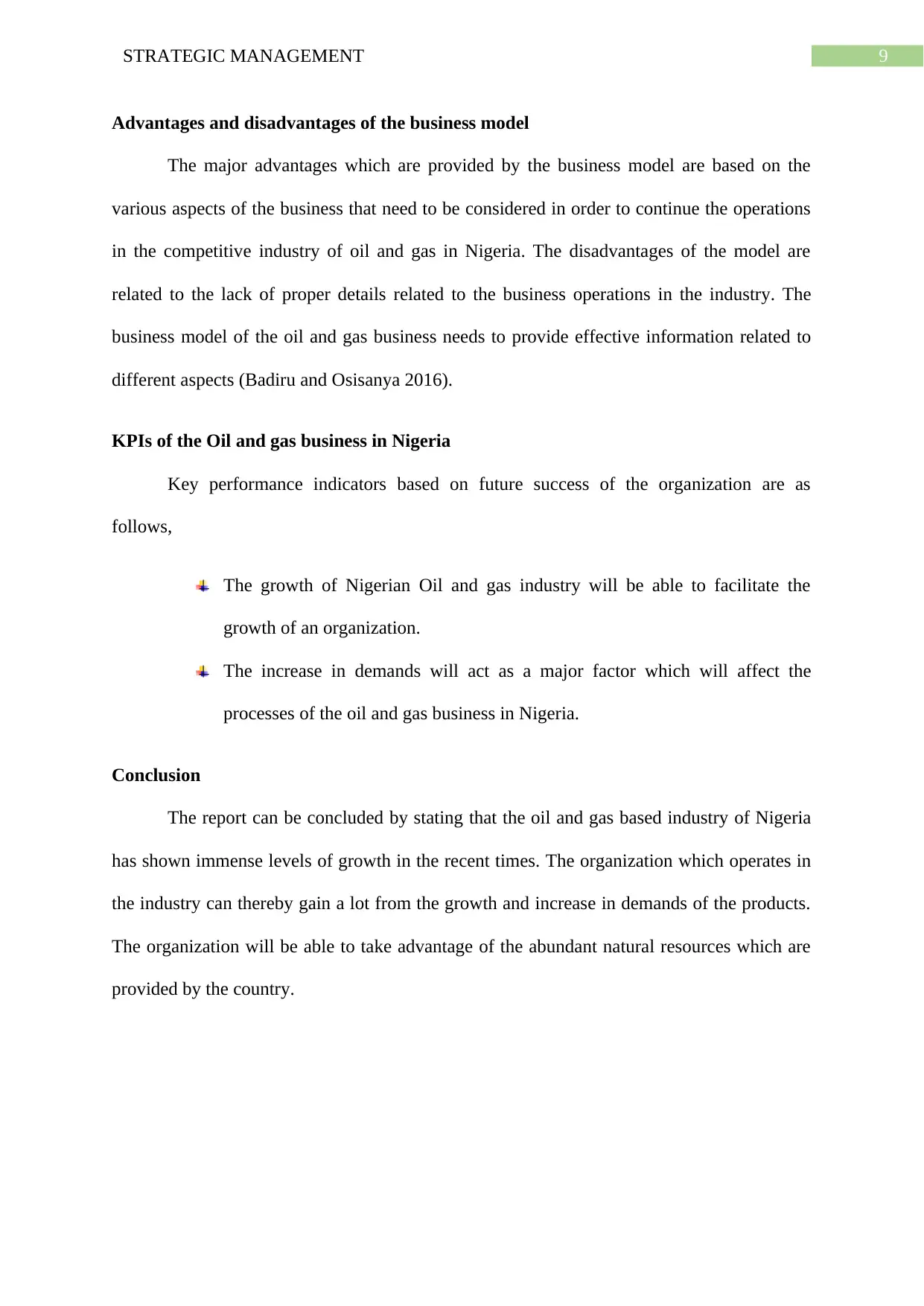
9STRATEGIC MANAGEMENT
Advantages and disadvantages of the business model
The major advantages which are provided by the business model are based on the
various aspects of the business that need to be considered in order to continue the operations
in the competitive industry of oil and gas in Nigeria. The disadvantages of the model are
related to the lack of proper details related to the business operations in the industry. The
business model of the oil and gas business needs to provide effective information related to
different aspects (Badiru and Osisanya 2016).
KPIs of the Oil and gas business in Nigeria
Key performance indicators based on future success of the organization are as
follows,
The growth of Nigerian Oil and gas industry will be able to facilitate the
growth of an organization.
The increase in demands will act as a major factor which will affect the
processes of the oil and gas business in Nigeria.
Conclusion
The report can be concluded by stating that the oil and gas based industry of Nigeria
has shown immense levels of growth in the recent times. The organization which operates in
the industry can thereby gain a lot from the growth and increase in demands of the products.
The organization will be able to take advantage of the abundant natural resources which are
provided by the country.
Advantages and disadvantages of the business model
The major advantages which are provided by the business model are based on the
various aspects of the business that need to be considered in order to continue the operations
in the competitive industry of oil and gas in Nigeria. The disadvantages of the model are
related to the lack of proper details related to the business operations in the industry. The
business model of the oil and gas business needs to provide effective information related to
different aspects (Badiru and Osisanya 2016).
KPIs of the Oil and gas business in Nigeria
Key performance indicators based on future success of the organization are as
follows,
The growth of Nigerian Oil and gas industry will be able to facilitate the
growth of an organization.
The increase in demands will act as a major factor which will affect the
processes of the oil and gas business in Nigeria.
Conclusion
The report can be concluded by stating that the oil and gas based industry of Nigeria
has shown immense levels of growth in the recent times. The organization which operates in
the industry can thereby gain a lot from the growth and increase in demands of the products.
The organization will be able to take advantage of the abundant natural resources which are
provided by the country.
Paraphrase This Document
Need a fresh take? Get an instant paraphrase of this document with our AI Paraphraser
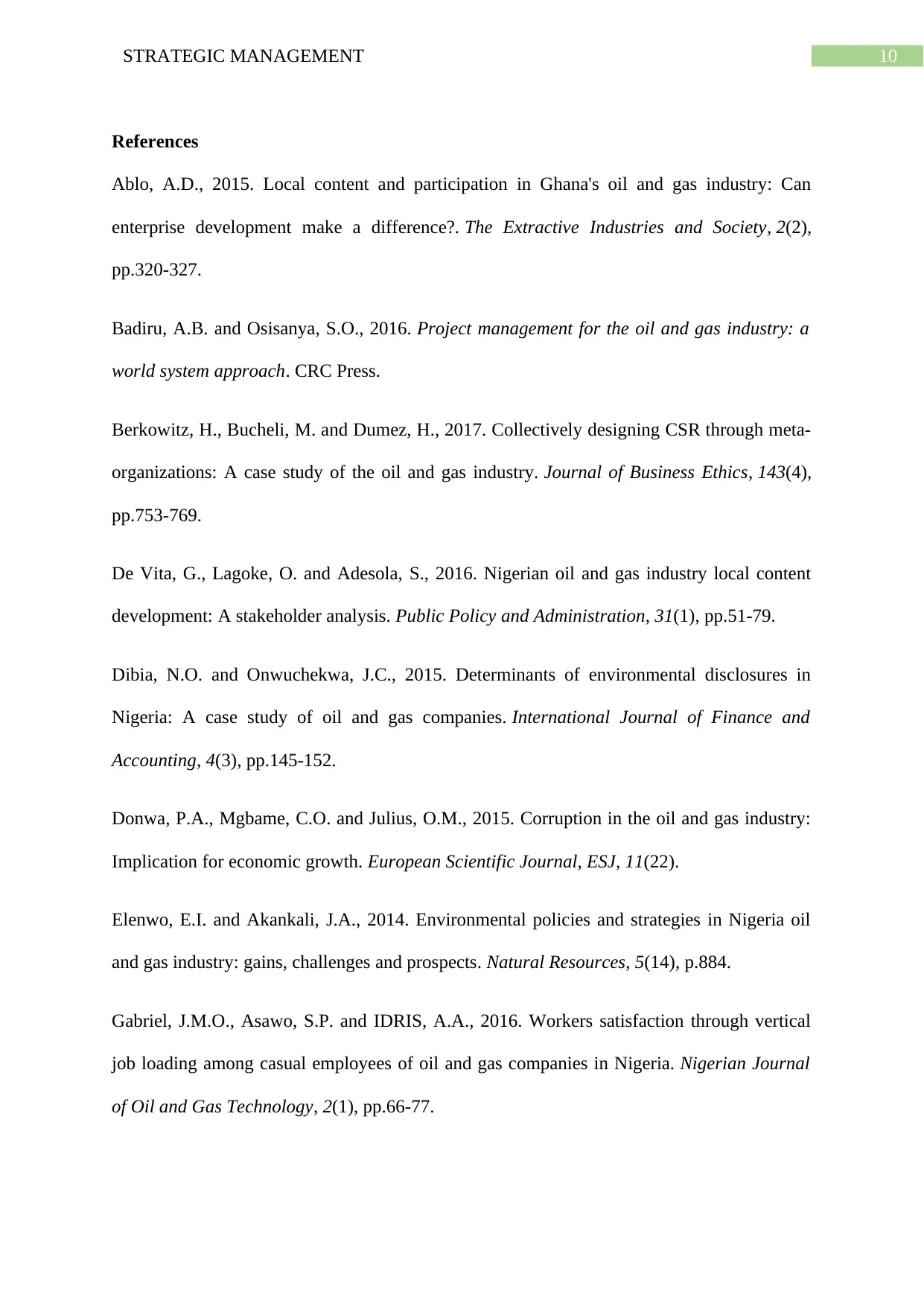
10STRATEGIC MANAGEMENT
References
Ablo, A.D., 2015. Local content and participation in Ghana's oil and gas industry: Can
enterprise development make a difference?. The Extractive Industries and Society, 2(2),
pp.320-327.
Badiru, A.B. and Osisanya, S.O., 2016. Project management for the oil and gas industry: a
world system approach. CRC Press.
Berkowitz, H., Bucheli, M. and Dumez, H., 2017. Collectively designing CSR through meta-
organizations: A case study of the oil and gas industry. Journal of Business Ethics, 143(4),
pp.753-769.
De Vita, G., Lagoke, O. and Adesola, S., 2016. Nigerian oil and gas industry local content
development: A stakeholder analysis. Public Policy and Administration, 31(1), pp.51-79.
Dibia, N.O. and Onwuchekwa, J.C., 2015. Determinants of environmental disclosures in
Nigeria: A case study of oil and gas companies. International Journal of Finance and
Accounting, 4(3), pp.145-152.
Donwa, P.A., Mgbame, C.O. and Julius, O.M., 2015. Corruption in the oil and gas industry:
Implication for economic growth. European Scientific Journal, ESJ, 11(22).
Elenwo, E.I. and Akankali, J.A., 2014. Environmental policies and strategies in Nigeria oil
and gas industry: gains, challenges and prospects. Natural Resources, 5(14), p.884.
Gabriel, J.M.O., Asawo, S.P. and IDRIS, A.A., 2016. Workers satisfaction through vertical
job loading among casual employees of oil and gas companies in Nigeria. Nigerian Journal
of Oil and Gas Technology, 2(1), pp.66-77.
References
Ablo, A.D., 2015. Local content and participation in Ghana's oil and gas industry: Can
enterprise development make a difference?. The Extractive Industries and Society, 2(2),
pp.320-327.
Badiru, A.B. and Osisanya, S.O., 2016. Project management for the oil and gas industry: a
world system approach. CRC Press.
Berkowitz, H., Bucheli, M. and Dumez, H., 2017. Collectively designing CSR through meta-
organizations: A case study of the oil and gas industry. Journal of Business Ethics, 143(4),
pp.753-769.
De Vita, G., Lagoke, O. and Adesola, S., 2016. Nigerian oil and gas industry local content
development: A stakeholder analysis. Public Policy and Administration, 31(1), pp.51-79.
Dibia, N.O. and Onwuchekwa, J.C., 2015. Determinants of environmental disclosures in
Nigeria: A case study of oil and gas companies. International Journal of Finance and
Accounting, 4(3), pp.145-152.
Donwa, P.A., Mgbame, C.O. and Julius, O.M., 2015. Corruption in the oil and gas industry:
Implication for economic growth. European Scientific Journal, ESJ, 11(22).
Elenwo, E.I. and Akankali, J.A., 2014. Environmental policies and strategies in Nigeria oil
and gas industry: gains, challenges and prospects. Natural Resources, 5(14), p.884.
Gabriel, J.M.O., Asawo, S.P. and IDRIS, A.A., 2016. Workers satisfaction through vertical
job loading among casual employees of oil and gas companies in Nigeria. Nigerian Journal
of Oil and Gas Technology, 2(1), pp.66-77.
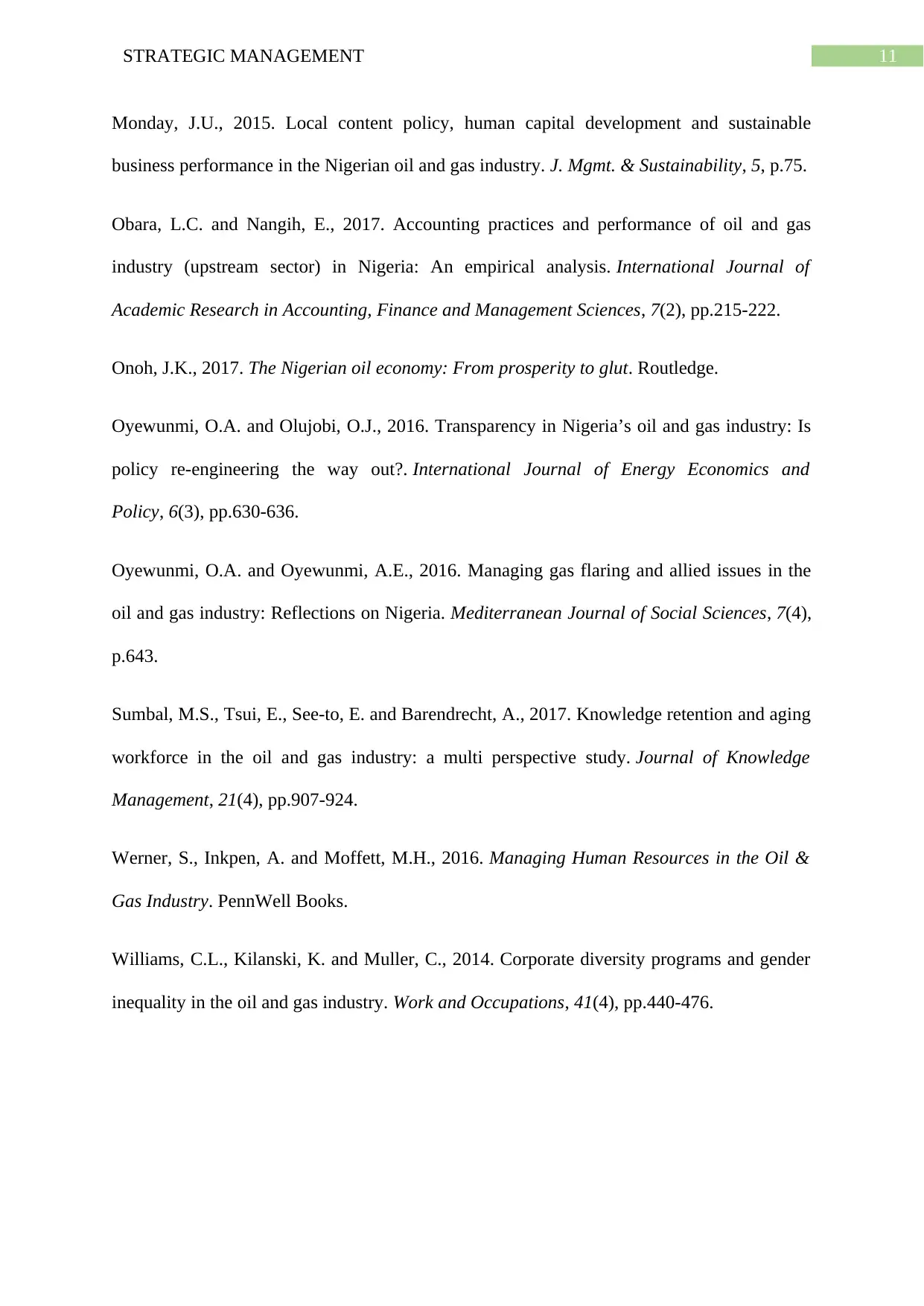
11STRATEGIC MANAGEMENT
Monday, J.U., 2015. Local content policy, human capital development and sustainable
business performance in the Nigerian oil and gas industry. J. Mgmt. & Sustainability, 5, p.75.
Obara, L.C. and Nangih, E., 2017. Accounting practices and performance of oil and gas
industry (upstream sector) in Nigeria: An empirical analysis. International Journal of
Academic Research in Accounting, Finance and Management Sciences, 7(2), pp.215-222.
Onoh, J.K., 2017. The Nigerian oil economy: From prosperity to glut. Routledge.
Oyewunmi, O.A. and Olujobi, O.J., 2016. Transparency in Nigeria’s oil and gas industry: Is
policy re-engineering the way out?. International Journal of Energy Economics and
Policy, 6(3), pp.630-636.
Oyewunmi, O.A. and Oyewunmi, A.E., 2016. Managing gas flaring and allied issues in the
oil and gas industry: Reflections on Nigeria. Mediterranean Journal of Social Sciences, 7(4),
p.643.
Sumbal, M.S., Tsui, E., See-to, E. and Barendrecht, A., 2017. Knowledge retention and aging
workforce in the oil and gas industry: a multi perspective study. Journal of Knowledge
Management, 21(4), pp.907-924.
Werner, S., Inkpen, A. and Moffett, M.H., 2016. Managing Human Resources in the Oil &
Gas Industry. PennWell Books.
Williams, C.L., Kilanski, K. and Muller, C., 2014. Corporate diversity programs and gender
inequality in the oil and gas industry. Work and Occupations, 41(4), pp.440-476.
Monday, J.U., 2015. Local content policy, human capital development and sustainable
business performance in the Nigerian oil and gas industry. J. Mgmt. & Sustainability, 5, p.75.
Obara, L.C. and Nangih, E., 2017. Accounting practices and performance of oil and gas
industry (upstream sector) in Nigeria: An empirical analysis. International Journal of
Academic Research in Accounting, Finance and Management Sciences, 7(2), pp.215-222.
Onoh, J.K., 2017. The Nigerian oil economy: From prosperity to glut. Routledge.
Oyewunmi, O.A. and Olujobi, O.J., 2016. Transparency in Nigeria’s oil and gas industry: Is
policy re-engineering the way out?. International Journal of Energy Economics and
Policy, 6(3), pp.630-636.
Oyewunmi, O.A. and Oyewunmi, A.E., 2016. Managing gas flaring and allied issues in the
oil and gas industry: Reflections on Nigeria. Mediterranean Journal of Social Sciences, 7(4),
p.643.
Sumbal, M.S., Tsui, E., See-to, E. and Barendrecht, A., 2017. Knowledge retention and aging
workforce in the oil and gas industry: a multi perspective study. Journal of Knowledge
Management, 21(4), pp.907-924.
Werner, S., Inkpen, A. and Moffett, M.H., 2016. Managing Human Resources in the Oil &
Gas Industry. PennWell Books.
Williams, C.L., Kilanski, K. and Muller, C., 2014. Corporate diversity programs and gender
inequality in the oil and gas industry. Work and Occupations, 41(4), pp.440-476.
⊘ This is a preview!⊘
Do you want full access?
Subscribe today to unlock all pages.

Trusted by 1+ million students worldwide
1 out of 12
Related Documents
Your All-in-One AI-Powered Toolkit for Academic Success.
+13062052269
info@desklib.com
Available 24*7 on WhatsApp / Email
![[object Object]](/_next/static/media/star-bottom.7253800d.svg)
Unlock your academic potential
Copyright © 2020–2025 A2Z Services. All Rights Reserved. Developed and managed by ZUCOL.





